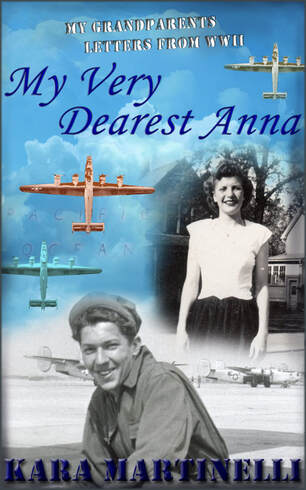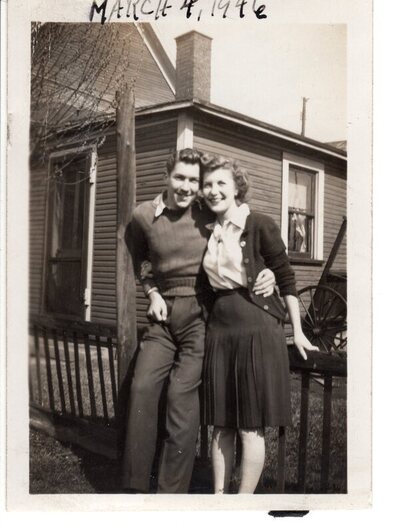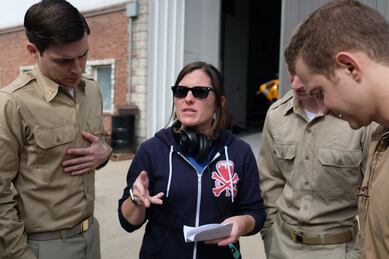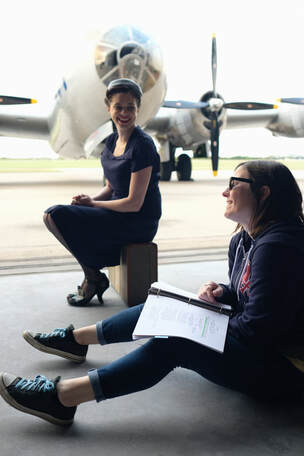 Past posts have introduced legacy writing, and the importance of letters in writing history as shown in Yours in a Hurry. I’m starting work on my father’s World War 2 letters, and Kara Martinelli White successfully used her ancestor’s letters, in this case her grandfather’s, to share his World War 2 story. I owe Kara a debt of gratitude. I met her at one of her book signings, and it was her encouragement that led me to take another look at my father’s letters. I mentioned to her that his were so highly censored, that I doubted they were usable. Her reply was, “Continue reading them, you never know what you’re going to find.” I went back, read to the end of the nearly one-hundred and found many further into the war were less censored and give fascinating details of India and camp life. As you’ll see, in My Very Dearest Anna Kara has truly left a legacy for her family and the families of others. Here’s her story.  Grandma and Grandpa Martinelli Grandma and Grandpa Martinelli Memorable Relationships My Grandparents and I had a wonderful relationship. I’m incredibly lucky to have had two such wonderful people in my life. I spent a good amount of time at their home with my siblings and cousins. Spending summers playing Nintendo in the cool basement with a reprieve of running upstairs to grab a Snickers ice cream bar or Push-up pop out of their freezer, only to return with a sibling taking the controller to play their own game, under that motto of “move your feet, lose your seat”. Or working puzzle races devised by Grandma to get us all to be quiet, with a cash reward of the winner of working their puzzle the fastest. And we would spend time there after school, racing through doing our homework so we could have more fun. My Grandma passed away when I was only fourteen. I had never known such pain. I had never experienced someone dying at this young point in my life, let alone someone that I loved so dearly. This left me with spending a lot of time with my Grandpa as I grew into an adult. When I was in college, one of my first class assignments was to write a paper about a friend of yours who was not in your generation. At eighteen, the only one I had was my Grandpa. He agreed to it and thought we could talk about his time in the war. I had no idea that Grandpa was in WWII and immediately had lots of questions. This led to a new relationship. One where we would spend hours looking at old photo albums talking about stories from the past, with breaks to watch some Turner Classic Movies. One day he brought out a box full of his letters to my Grandma that he had written during the war. For some reason, I didn’t want to read them, feeling they were too private for me to look at him, despite his insistence. I really don’t know why I didn’t want to read them. I hate that I did this. After his death in 2008, my Mom gave me the box of letters saying I was the one that should have them. I sat on them for a few years until I finally decided to read them. It was too hard for me to do it. And once I started, I had a flood of new questions that I could never have an answer to. One of my biggest regrets was not reading those letters when my Grandpa showed them to me at his kitchen table. Don’t get me wrong, I am grateful that I at least have this wonderful collection a small snapshot of WWII history and family history. I’m just sad at knowing how much knowledge I lost because of my reluctance. Sharing the Memories I decided that I should not be the only one with this story at my disposal. I started writing my book “My Very Dearest Anna” after I had decided that my family should have copies of these letters, and the more I talked about it, the more people were interested in their story. Going through a journey of research and memories, I had finished a story about my Grandparents through the story of their letters to each other, with filling in the blanks with the stories my Grandpa would tell me as we looked over his old photos from his time in the Pacific. My Grandpa had served in the Army Air Corps as a tail gunner in B-24 Liberator bombers in the Pacific Theater. My book follows his journey of leaving home in small New Philadelphia, Ohio, where he had the nerve to ask the girl he liked to go out on a date before leaving for war. Following his story of training and all the way to the far reaches of Okinawa, where he was at the end of the war, and then back home again to his waiting Anna. Titling his letters, “My Very Dearest Anna”, is where I found the inspiration for the title of the book.  Postscripts One of the great things about having such a wonderful Grandpa as my best friend, encouraged me to do the things I am doing today. I now have a life as a documentary filmmaker, mostly telling stories of the men and women who served in WWII. He inspired me to tell more of these important stories of the determination and sacrifice of that generation with the hopes that we would never again have to know that heartbreak and tragedy they endured. My husband shares my passion for story telling and we produce these documentaries through our company Hemlock Films. Every day I wish my husband could have met my Grandpa. They really would have liked each other. I strongly encourage exploring your own family history to discover what stories await for you to find. You never know what you’re going to get.  Kara and WWII reenactor Kara and WWII reenactor *Kara White (Martinelli) is an Emmy-Winning Producer, Director and Writer at Hemlock Films creating historical and aviation documentaries. “My Very Dearest Anna” by Kara Martinelli is available at www.flightcinema.com along with all of Hemlock Films documentary titles. It is also available on Amazon. Next time: Understanding Your Father's War Ann Otto writes fiction based on factual as well as oral history. Her debut novel, Yours in a Hurry, about Ohioans relocating to California in the 1910’s, is available online at Amazon, Barnes & Noble, and Kindle. Her academic background is in history, English, and behavioral science, and she has published in academic and professional journals. She enjoys speaking with groups about all things history, writing, and the events, locations, and characters from Yours in a Hurry and her current projects, which include research about Ohio’s Appalachia in the 1920’s and a compilation of her father’s World War 2 letters. She blogs on history and writing and can be reached through the website, https://www.ann-otto.com/ , or at Facebook@Annottoauthor and www.Goodreads.com
0 Comments
Leave a Reply. |
Archives
August 2020
Categories
All
|
 RSS Feed
RSS Feed